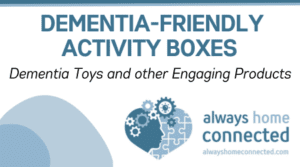Living Well with Dementia: Promoting Quality of Life
 Submitted by Mary Anne Roberto,
Submitted by Mary Anne Roberto,
The Co-founder of
Always Home Connected
Strategies to support families when dealing with a diagnosis of Alzheimer’s disease or another form of dementia.
A diagnosis of dementia often triggers fear, sadness, and uncertainty—not only for the person affected but for their loved ones as well. While it is true that dementia brings about challenges, it is equally important to acknowledge that life doesn’t end with the diagnosis. Instead, with the right strategies and support, individuals living with dementia can continue to live meaningful, fulfilling lives. Focusing on quality of life, maintaining independence, and fostering connection are key in ensuring that people with dementia can continue to thrive in their own homes and communities.
Staying at Home: The Comfort of Familiarity
 One of the most crucial factors for promoting quality of life in people with dementia is the ability to remain in familiar surroundings for as long as possible. Research shows that staying in one’s own home, surrounded by familiar objects and routines, helps maintain cognitive function, emotional well-being, and physical health. The comfort of a known environment can provide stability in the midst of memory loss, making home the best place for many people living with dementia. Home environments allow for the continuation of cherished daily routines, from favorite meals to regular TV shows, which contribute to a sense of normalcy and comfort.
One of the most crucial factors for promoting quality of life in people with dementia is the ability to remain in familiar surroundings for as long as possible. Research shows that staying in one’s own home, surrounded by familiar objects and routines, helps maintain cognitive function, emotional well-being, and physical health. The comfort of a known environment can provide stability in the midst of memory loss, making home the best place for many people living with dementia. Home environments allow for the continuation of cherished daily routines, from favorite meals to regular TV shows, which contribute to a sense of normalcy and comfort.
Supporting dementia patients at home involves making a few adjustments to ensure safety and reduce confusion. Simple steps like improving lighting, using contrasting colors to aid visibility, and placing labels on doors can make a home dementia-friendly. Dementia-friendly products like those from Always Home Connected—such as easy-to-use phones, reminder clocks, and adaptable furniture—are essential in helping individuals maintain their autonomy while living comfortably at home.
The Power of Routine
Routine plays an important role in helping individuals with dementia feel more secure. Establishing a regular daily schedule helps minimize confusion and anxiety by providing a predictable structure. Scheduling mentally demanding tasks, such as appointments or shopping, for times when a person feels most alert can also make a significant difference in managing cognitive changes. By promoting a sense of control over their day, routines can help individuals living with dementia maintain dignity and independence.
Engaging Activities: Creativity and Purpose
 One of the best ways to enhance the quality of life for people with dementia is to encourage participation in meaningful activities that stimulate the mind, body, and spirit. Creative activities such as adult coloring books, crafting, and music therapy can bring immense joy and offer a sense of accomplishment. Encouraging a person with dementia to engage in hobbies they have always enjoyed, whether it’s gardening, painting, or playing an instrument, can bolster self-esteem and foster a sense of purpose.
One of the best ways to enhance the quality of life for people with dementia is to encourage participation in meaningful activities that stimulate the mind, body, and spirit. Creative activities such as adult coloring books, crafting, and music therapy can bring immense joy and offer a sense of accomplishment. Encouraging a person with dementia to engage in hobbies they have always enjoyed, whether it’s gardening, painting, or playing an instrument, can bolster self-esteem and foster a sense of purpose.
Furthermore, activities that encourage physical movement, such as gentle yoga, tai chi, or simply taking daily walks, are highly beneficial. Physical activity helps to improve mood, increase circulation, and maintain mobility, reducing the risk of falls and injury【10†source】. Exercise also stimulates cognitive function and provides an opportunity for social interaction, which can alleviate feelings of isolation and depression.
For example, Always Home Connected offers tools like simple exercise equipment and gardening aids designed specifically for people with dementia. These products make it easier to integrate physical activity into daily routines, promoting both mental and physical well-being.
The Importance of Social Connections
 Social engagement is another critical component in living well with dementia. Human connection fosters emotional well-being and helps combat the loneliness that often accompanies dementia. Whether it’s through participation in community groups, music and singing programs, or regular visits with friends and family, staying socially active supports cognitive function and provides individuals with a sense of belonging.
Social engagement is another critical component in living well with dementia. Human connection fosters emotional well-being and helps combat the loneliness that often accompanies dementia. Whether it’s through participation in community groups, music and singing programs, or regular visits with friends and family, staying socially active supports cognitive function and provides individuals with a sense of belonging.
Even small efforts, like organizing a weekly visit to a local park or joining a group through organizations such as the Alzheimer’s Society, can make a world of difference. Social activities not only offer enjoyment but also provide opportunities for meaningful connections and shared experiences.
Adapting to Change: Flexibility and Support
 Living well with dementia also requires flexibility. It’s important to recognize that as the condition progresses, daily activities may need to be adapted to suit changing abilities. Caregivers can help by gently guiding their loved ones through tasks rather than taking over entirely, allowing them to maintain their sense of independence for as long as possible. This approach promotes dignity and self-worth, even in the face of cognitive decline.
Living well with dementia also requires flexibility. It’s important to recognize that as the condition progresses, daily activities may need to be adapted to suit changing abilities. Caregivers can help by gently guiding their loved ones through tasks rather than taking over entirely, allowing them to maintain their sense of independence for as long as possible. This approach promotes dignity and self-worth, even in the face of cognitive decline.
Moreover, seeking external support is key to navigating the complexities of dementia care. Home care services and products tailored to dementia can alleviate some of the challenges of caregiving and enable individuals to live well at home for as long as possible. Always Home Connected provides caregivers with solutions ranging from specialized home care packages to respite care options that give them a much-needed break while ensuring their loved ones are well cared for.
Conclusion
Living well with dementia is about promoting quality of life through thoughtful adjustments, engaging activities, and meaningful connections. While the road may be challenging, it is possible to continue leading a rich and fulfilling life after a dementia diagnosis. By focusing on maintaining independence, fostering creativity, and nurturing social bonds, individuals with dementia can continue to live with purpose, dignity, and joy. Always Home Connected and similar resources offer vital tools and support to help people with dementia thrive at home, allowing them to enjoy life’s moments, no matter how small.
References:
- https://www.alzheimers.org.uk/get-support/help-dementia-care/understanding-supporting-person-dementia-psychological-emotional-impact
- https://www.hopkinsmedicine.org/health/wellness-and-prevention/safe-and-happy-at-home
- https://alwayshomeconnected.com/blogs/news/caring-for-the-elderly-at-home
- https://www.brightfocus.org/alzheimers/article/making-your-home-dementia-friendly
- https://www.whereyoulivematters.org/resources/importance-of-routines-for-dementia/
- https://alwayshomeconnected.com/blogs/news/meaningful-activities-for-dementia-patients
- https://alwayshomeconnected.com/
- https://www.ncbi.nlm.nih.gov/pmc/articles/PMC6969951/
 Submitted by Mary Anne Roberto,
Submitted by Mary Anne Roberto,
The Co-founder of Always Home Connected
About The Author
 Mary Anne Roberto is dedicated to enhancing the lives of those experiencing cognitive changes. Her mission is to create awareness around dementia and to equip caregivers with the essential resources and tools they need to navigate the daily challenges of caregiving with confidence and compassion. As the Owner and CEO of Elder-Well® Adult Day Program in Santa Monica, California, Mary Anne is a highly regarded Dementia Care Specialist (C.D.S.), RCFE, CNA, and Certified Positive Approach To Care Consultant. She is also the co-founder of Always Home Connected, an online e-commerce service dedicated to offering resources and support for individuals with dementia and their caregivers.
Mary Anne Roberto is dedicated to enhancing the lives of those experiencing cognitive changes. Her mission is to create awareness around dementia and to equip caregivers with the essential resources and tools they need to navigate the daily challenges of caregiving with confidence and compassion. As the Owner and CEO of Elder-Well® Adult Day Program in Santa Monica, California, Mary Anne is a highly regarded Dementia Care Specialist (C.D.S.), RCFE, CNA, and Certified Positive Approach To Care Consultant. She is also the co-founder of Always Home Connected, an online e-commerce service dedicated to offering resources and support for individuals with dementia and their caregivers.
